

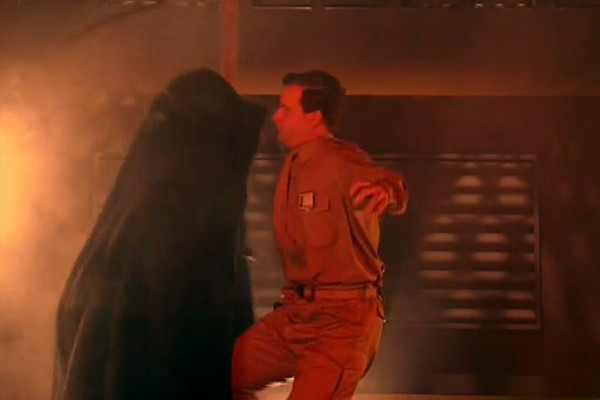
That Only The Good... is one of the better episodes of series eight is a testament to how horrifically poor the 1999 series was. Attempts to get a film off the ground never received enough financial backing, and the BBC, long rumoured to have been against the programme, no longer had the justification that it was bringing in the ratings when those ratings vastly declined over the course of the series. Consequently Only The Good... became the last episode of Red Dwarf for a decade.
Only The Good... features some okayish scenes and the odd moment of inspiration here and there, but what really sinks it is what a complete mess the whole thing is, structurally. Making Pete look like the most finely-crafted episode ever made, while Red Dwarf didn't need to have tight plots in order to work, this is arguably the loosest they ever did, a "make it up as you go along" excursion that sees Red Dwarf devoured by a virus.
Discussed endings included Red Dwarf arriving on Earth, and Ace Rimmer saving the day... one that was filmed, and included on the DVD, sees all indulge in a complete non-joke of Rimmer trying to remember a long word, before saving the day and watching the Captain float away into space. While below par, it gives a resolution to the situation with the return of the Red Dwarf crew, the captain drifting helplessly in space as Rimmer pretends not to notice. Instead, they shelved it, and added a cliffhanger at the last minute, as well as a crass scene with Rimmer kneeing Death in the balls.
Perhaps the most uncomfortable moment occurs with Cat getting a "bitch" while in prison. It's not that it's vaguely homophobic, more that David Verrey plays it broadly, like most of the rest of the cast, in pure "sitcom" acting style, and also the realisation that Naylor, on the cusp of a new millennium, still thought such antiquated tropes had comic currency two decades on from the 70s. Such a mindset perhaps explains the digital fonts used throughout the series, which were hugely dated even at the time.
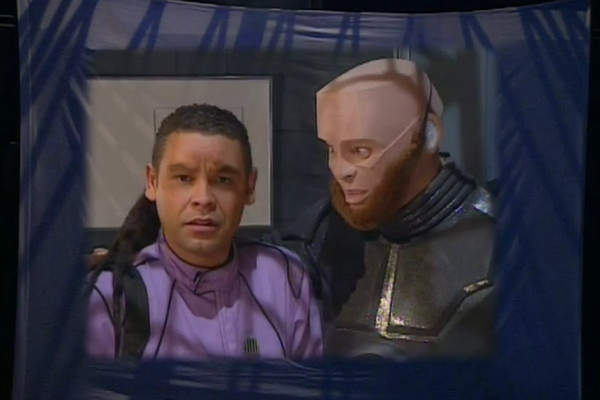
A satire of Beadle's About, two-and-a-half years after that series ended, though perhaps more up-to-date than Back In The Red's satire of Reservoir Dogs seven years after the fact. The oldest moment here is a "tilting heads to look at something explicit" routine which, in 1999, needed carbon dating. Red Dwarf was always a two-writer show, and having Doug Naylor write alone shows how limited his comic arsenal really was.
With the real-life relationship between Barrie and Charles having improved considerably, the two-man cell chats returned to the series. Sadly, they no longer had anything worthwhile to say to one another, or, indeed, any gags. Yet most significant is just how sexist this episode is. A more sophisticated episode could have suggested that it was there for satirical purposes, but this is the Dapper Laughs of Red Dwarf, especially as it's based around the nudity of Kochanski, a woefully-written "female" character who would fail every Bechdel Test going. There's no point breaking out a copy of Kaplan's theory on The Male Gaze when the entire point of the episode is precisely proving it.
Worst of all - at the risk of taking Red Dwarf far too seriously - it also undermines Lister's character, in that being complicit in watching Kochanski naked in front of a roomful of men, it makes him disloyal and lacking in the strict morality that made Lister so appealing for the first five years. And while Red Dwarf always had one eye on some crasser jokes, having Lister cutting off his pubic hair seems too low for the series. Finally, it's also the episode where Graham McTavish decides to camp it up as Warden Ackerman. Although having appeared briefly in three prior episodes, they were relatively restrained performances, but here he goes full panto. Such a decision clearly appeared to be the actor's own, as both Charles and Naylor remark that it wasn't played as written, and, despite Barrie politely praising it on the behind-the-scenes documentary, the commentary track sees him ask "Why did he send it this camp route?"
Plot-wise, Krytie TV is better worked out than the majority of series eight episodes, causing it to rank highly when ranked against the rest of the 1999 output. However, for a true indication of how bad series eight really was, then every episode - minus one exception - comfortably fits here in the bottom ten.
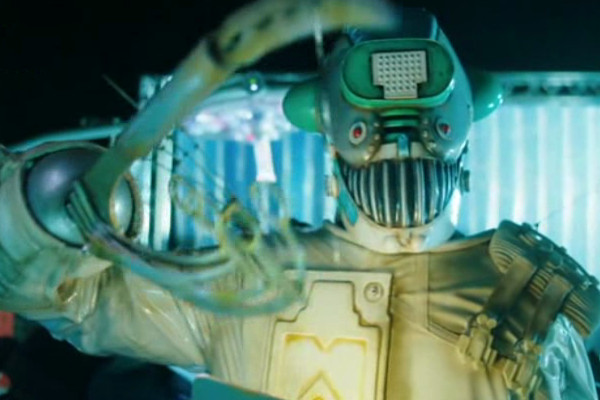
Red Dwarf isn't always the classiest show in the world - just the third episode had a talking toilet, for example - but having a robot snack dispenser, cheaply made as a parody of Robby the Robot, is beneath the show, more Galloping Galaxies than the show we know. So too is the EDM soundtrack for that matter, while the T-Shirts on sale with the slogan "Captain Bollocks" ably illustrate how far the show can go for cheap laughs.
Time-travel shenanigans are always something Red Dwarf does well, but they've been done far better elsewhere in many other episodes, to say nothing of the huge plot hole right at the centre of this one... if Lister had his kidneys removed before they went to the space station, how did the insane android remove them in the first place? Defenders on Twitter state that there's nothing suggesting that the kidneys on display are Lister's, and that it could be just an assumption on the part of the crew. Which is a perfectly valid point... but then, if that's the case, why was Lister registering as having no kidneys afterwards? Red Dwarf XI did suffer from being one of the most directionless series the show did, and instalments like this sadly do little more than fill time.
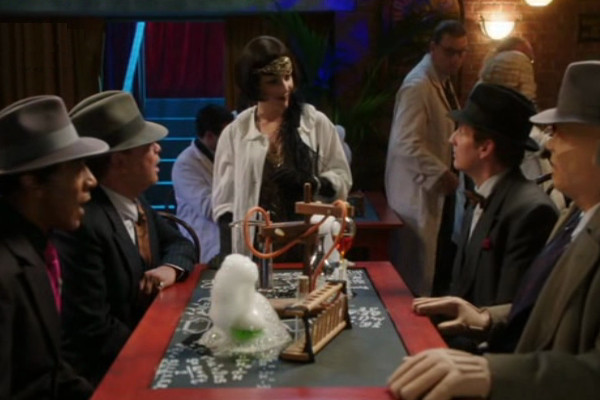
For the second time a series opens with an off-beat story set in a contemporary America. After a clash with Simulants (lead by a wasted Kevin Eldon), the group arrive in a 1952 where time hasn't moved on since the 1920s, and technology is prohibited. While the episode scores relatively highly due to some level of invention and a vague charm, it's one of the least funny instalments.
However, when so much of the humour is stripped down to bare basics and easy lines (Cat does a fashion gag... Rimmer gets immediately contradicted in what he's saying, etc.) it does tend to submerge Lister in the narrative. As he was the lead character in the programme, the others foils to back him up, a lot of early Lister scenes from the 80s involved dialogue that went beyond simplistic punchline/feedline.
Placed into a more two-dimensional setting, and there's nothing intrinsically funny about Lister's character that makes it amusing in and of itself, at least in comparison to the others. Add to this Craig Charles not seeming to get a full take on the character this time around and for 2016 Red Dwarf became a series where its ostensible lead character became its least developed.

It's easy to feel sorry for Doug Naylor with series seven. Agreeing to write 16 more episodes of the series so that it could reach syndication numbers, he found that his writing partner had left and taken all the jokes with him (though dropped them on the way to his typewriter before he started work on The Strangerers) and the main star of the series had announced he didn't really want to do it any more, and would only appear in half the episodes. Consequently, while series seven is hugely flawed, it should at least be given credit for daring to try.
Ouroboros sees the return of Kristine Kochanski to the Red Dwarf universe, as well as the real story behind Lister's origins. Unfortunately neither really come off, as Lister is revealed to be his own father, which is sci-fi nonsense, and Kochanski goes through two series with less than a dozen funny lines. It's a chronically bad instalment, comedically, with Naylor weighing far too heavily on his lazy use of overlong similes like an arthritic nun at a Mogadon-addicted snail's meditation convention.
The big contention here is the replacement of Kochanski. Chloë Annette is a fair actress, and original Kochanski Clare Grogan had some shaky moments (somewhat cruelly targeted by John-Jules on the DVD commentary tracks) but a "head swap" recasting is always a little hard to take, particularly as Grogan had a cameo in Psirens just the prior series. Perhaps most hard to come to terms with is not the change in face (they talk about anomalies in Tikka To Ride, so a generous-minded viewer could make the stretch...) or the change in continuity, first meted out in D.N.A., that Lister had dated Kochanski, but that Grogan was Scottish. Here the cut-glass Annette is a completely different character, and it takes an enormous amount of goodwill to take it on board.
Series seven had been delayed for a variety of reasons, one of which was Craig Charles being imprisoned while on rape allegations for which he was eventually acquitted. Repeats of certain series six episodes had been postponed as a result, so it's something of a surprise that the post-series six Lister is recrafted as so morally repugnant. While most of this occurs in series eight's Back In The Red, where Lister attempts to get involved in two rapes, Ouroboros sees Lister steal a kiss from Kochanski under the full knowledge that she's mistaken him for his parallel universe counterpart.
In terms of continuity, then things get even further complicated by an opening scene which sees baby Lister in a cardboard box in 2155... which is neither the 2055 it should have been to match the original two series, OR the "23rd century" referenced in D.N.A. There's a vast number of problems with this episode, ranging from Lister again able to get back to Earth, down to the fact that Lister then spends the rest of the series setting out to be the ultimate MF. Ultimately it's a show that takes its own SF origins far too seriously, and is something of a mess.
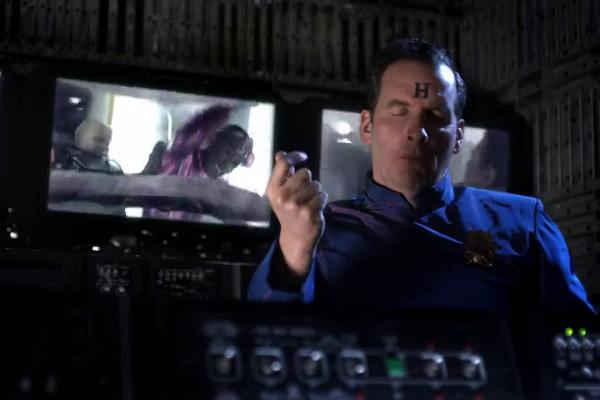
Back To Earth was a three-part special that aired on the Dave Channel over Easter 2009. Although this was the first time the series had been made without the BBC, it wasn't quite a complete break from the corporation, as the BBC have a 50% share in Dave, and have later included the Dave episodes on their IPlayer facility.
The special aired over three consecutive days, and although the opening night's 2.36 million viewers didn't quite stick with it, the concluding 1.24 and 1.20 million more than justified continuing with the programme. Although at the time this special seemed like the final nail in the coffin of Red Dwarf, it can be appreciated more with the hindsight that it actually led to the series being recommissioned with, to date, 18 new episodes and a TV movie.
it's easy to look fondly on this special now it's not the story that ended it, but the show that brought it back. Doug Naylor gives it a filmic look on a budget, his direction thoughtful, and, greenscreen aside, it looks terrific in parts. That said, the Dave Channel episodes are far from the show at its peak, and the cast, all past forty, lack the same vitality and energy they once had.
Red Dwarf was always a curious hybrid of a show - a sci-fi sitcom - and consequently it always only worked with a studio audience, the cast's timing hurt without it (Danny John-Jules particularly). Comedically this first episode is a washout, so much so that it's possible to believe it was recorded in front of an audience, and was met with stunned silence. Yet it's harmless and inoffensive enough, a victory lap that - while perhaps slightly undeserved after the debacle that was series eight - would take the hardest of hearts not feel some affection for.
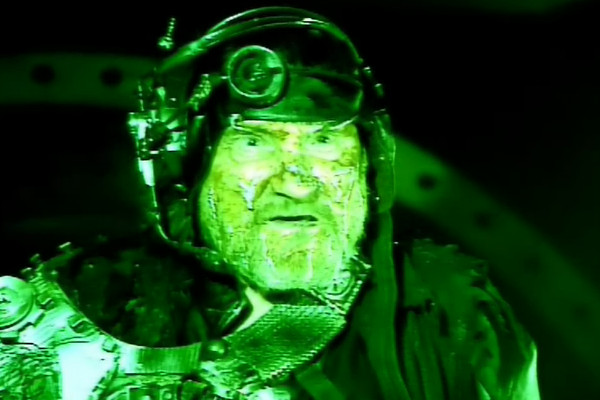
Written by Robert Llewellyn and Doug Naylor, it's something of a shame that Llewellyn was never given a second chance, even though Beyond A Joke very much does, as per its reputation, tank. A major issue is that Red Dwarf in 1997 seemed too content to hang on to current trends rather than plough its own path... here a two-years-too-late recreation of Pride and Prejudice seems a horrible attempt to be "zeitgeisty". It also undermines the fundamental set-up, in that in order for Kochanski's sophistication to be thrown into contrast, the IQs of the main cast are dumbed down even further into Beavis and Butthead territory.
Yet while the only joke in this episode is in the title, it's not horribly unfunny, more just kind of devoid of any real gags. Harmless rather than grating, although there is a ghoulish element to Don Henderson's guest role as a Simulant, given that his throaty voice wasn't a sound effect, but the effect of his terminal throat cancer. A Starbug sequence with EDM over the top is a bizarre choice of incidental music for the show and the final, curry-related, payoff is a stinker, but overall it's... okay.
Llewellyn wrote the episode with a minimal role for himself, to give him chance to avoid the Kryten make-up, but Naylor insisted he feature more. Altogether 35 drafts were written by Llewellyn, who had writing experience but regarded it as the hardest thing he'd ever done. Speaking on the DVD commentary, Llewellyn acknowledged that "I would never have done it again, say if Doug had said 'please write another one', I would have said 'no'. Not that he ever did, and he was right not to."
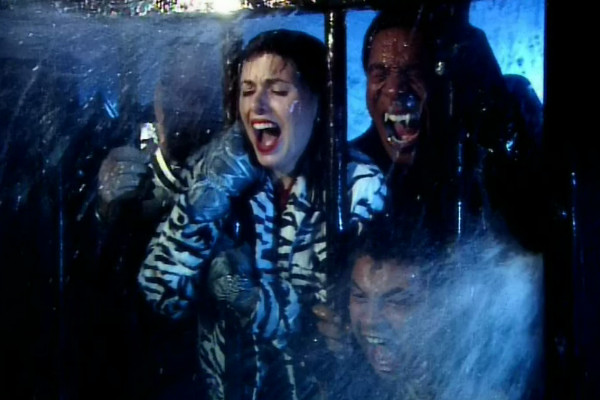
Although Red Dwarf was always based around male casts (the sexless Holly doesn't count) it was never an especially "laddish" show. In fact, Lister would show a sensitive side towards women in the earliest series, and most conversations that objectified women were usually rebuffed as the words of inadequate men. Unfortunately Red Dwarf in 1997 was without real direction, desperately feeling the loss of its ostensible leading man, and trying to retool Lister as the comic driving force, despite the fact it had begun to abandon him as the focal point since as early as 1989.
Into this comes Kochanski, the straight (wo)man the show didn't need, contributing nothing on a comedic level, while the humour of the show is retooled to follow the Men Behaving Badly/Lad Mag world of the late 90s which it inhabited. It doesn't help that Doug Naylor - an actual grown adult in his early 40s when this was scripted - writes Kochanski like a man who has never met a woman in his entire life before. Here is a character who talks about wanting to go shopping and doesn't understand the offside rule.
What also works against Kochanski is that, while it's more than possible to understand her point of view, the slobby crew of Red Dwarf have been the audience identification figures for six series. Having a brand new character come into the series to tell established regulars how terrible they are isn't a way to get viewers onside, though Annette's main function was to get backers interested in funding a film. It also doesn't help that, while a fair actress, Annette doesn't have a comedy background, so that she approaches the part as an acting one, rather than a purely comedic one, effectively becoming the Mike of the series. Though she at least fares better than the Cat, who has been reduced from one of the most original characters on TV into the most predictable and tedious over the space of nine years.
Lister's homophobia seems even more out of left field than his claustrophobia, but an episode where the crew are trapped together has the potential to be a minor classic... if the crew had anything still to say to one another. series seven drops the gag-a-minute format in favour of a more comedy-drama format, which has potential, though never quite comes off. Awful jokes in this one abound, like "To pee or not to pee, that is the question" and "What would you say to a glass of drinking chocolate?" "I'd say 'glass of drinking chocolate, get me out of here.'" Sadly, the funniest part of Duct Soup is the commentary track, which sees Chris Barrie remain in the booth for episodes he didn't even appear in (the first six in total) and he makes clear how unfunny and tedious he finds proceedings, with tongue only partly in cheek.
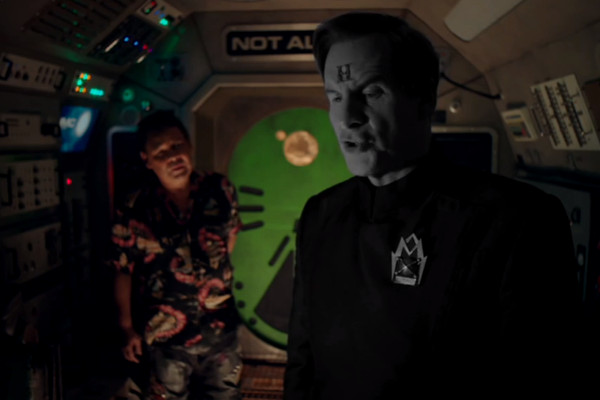
A pretty amusing feature-length special, the low placing of The Promised Land isn't a knock on its quality, more just that there are 58 better episodes. This is, of course, to be expected – as discussed elsewhere, the show's peak ended back in the early 1990s, and any new episodes are there to be enjoyed as a bonus.
Unfortunately for a Red Dwarf episode to sustain itself for almost 90 minutes, it needs a little breathing space in between all the "instant reverse" gags, and a larger-than-average number of dick jokes. It's a commendable attempt at something a bit different, but would have worked better when the series had dialogue-based humour and characterisation, rather than the gag-per-minute version on display here. Most of said gags are clearly telegraphed a mile off, and have been done many times before... this time Doug's magpie technique towards comedy relies not only on the back catalogue of the show itself, but even paraphrases some Douglas Adams.
Yet a very vocal audience seem to enjoy it, applauding variations on jokes heard many times before like songs from a band on a greatest hits tour... and doubtless slightly disappointed that a "Lister's Guitar" routine was one of the few old favourites missing. Norman Lovett manages to regain a lot of his old form as the returning Holly, and, while the attempts at depth are somewhat hamfisted and lacking the drama or genuine emotion of old, it's nice that they at least tried. Surprisingly Cat comes up shortest in a plotline that would seem to warrant some kind of development for him, but instead he barely has a response when meeting his own brother.
There is a feeling that there's a certain section of Red Dwarf fandom that will lap up anything with the "Red Dwarf" label on it, and not make any serious distinction between the Dave Channel episodes and the Grant-Naylor years for the BBC. Certainly this article has met with some hostile reactions from those who believe that "any Red Dwarf is good Red Dwarf", and that's unlikely to change here. But The Promised Land is just an okay semi-pastiche of itself that begins to get wearying over the extra runtime... the 80s and early 90s would have had the characters speak to one another, have realistic human emotions and jokes that may have surprised.
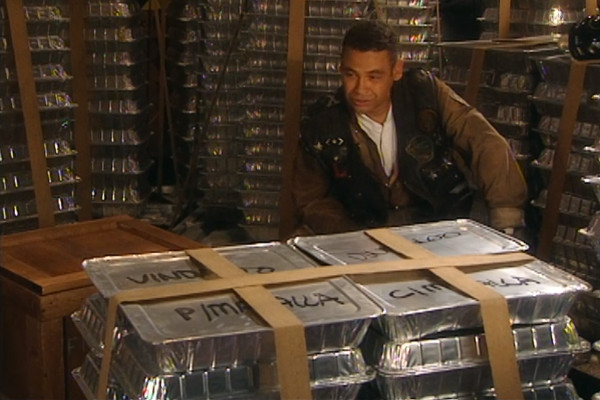
With a filmised look, no studio audience and Chris Barrie's obvious ennui, the atmosphere is very "off" in this series seven opener, particularly in the extended 38 minute cut with no laugh track. With no excitable audience whooping like it's a US sitcom, it really flags up just how unfunny the episode is, and how little Chris Barrie really cares. There's also the small matter of the improvements in Charles's acting. While he'll never be mistaken for DeNiro, in the three year break since the prior series he'd taken up serious roles in series like The Bill and Lynda La Plante dramas. Consequently he improved, which is a little disconcerting after seeing his efforts in earlier series, which nevertheless had a kind of feckless charm.
While perhaps best summed up as "flat", Tikka To Ride isn't obnoxiously unfunny like 90% of series eight, more just kind of harmlessly unamusing. Ironically enough, the best bit is probably the last five minutes, illustrating what took place after they all jumped Lister, even explaining that the time drive can't go back to present-day Earth... sadly, they threw it away and kept the rest.
The series sensibly reconfigures Lister as the main character, given that Rimmer left, but in so doing flags up the fact that Lister had become so sidelined that he barely had a character left at all. Consequently the comic lynchpin of this episode relies upon Lister "hilariously" being in pursuit of a good curry, or talking at length with Kryten about all the different side dishes that come with such a meal... seemingly in the belief that eating curry is some wild, zany pasttime, and not something that millions of people in the UK do every week. It's staid, reactionary humour, and somewhat desperate as a result. Though the very same day it aired, Channel 4 screened Captain Butler, making it only the second-worst comedy Craig Charles was appearing in that night.
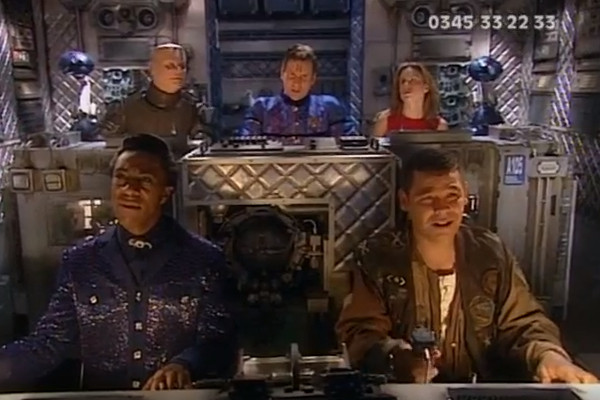
It speaks of the dire quality of series eight that this four-minute throwaway charity skit (airing in November 1998, three months before the launch of series eight) should be better than the majority of what it contained. It ends with a cheesy "Lister's guitar" routine, and Kochanski has still to be given a single funny line, but it's pleasant enough, and lacking in the somewhat obnoxious qualities that series eight possessed in abundance.